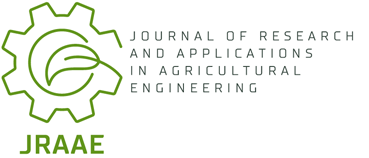Current issue
Online First
Archive
Instructions for Authors
Guide for Authors
Peer Review Policy
Research Ethics Policy
Ghostwriting and Guest Authorship
Copyright
Open Access Policy
Plagiarism
About the Journal
Aim and Scope
Scientific Board
Publisher
Editorial Board
Indexing in Databases
Personal Data Protection
Repository Policy
Contact
ORIGINAL PAPER
Organic food in consumer awareness of the Ostroleka County
1
Wyższa Szkoła Agrobiznesu w Łomży, ul. Studencka 19, 18-402 Łomża, Poland
2
Uniwersytet Rolniczy w Krakowie, Instytut Inżynierii Rolniczej i Informatyki
Journal of Research and Applications in Agricultural Engineering 2016;61(3):43-47
KEYWORDS
ABSTRACT
The level of consumer awareness related to organic farming among the residents of Ostroleka County is presented in the study. The research material consists of the survey data.120 people were surveyed in 2015. The questionnaire consisted of two parts. The first part concerned the information related to organic farming while the second one related to the information about a person interviewed. The obtained results of the research allow to conclude that 93% of the respondents have heard of the concept of organic food before. The vast majority of the people (84%) declared that they would start buying organic food if it were cheaper or if their income was higher. More than one quarter of the respondents buy organic food. The main reasons of buying organic food result from the fact that it is healthier than conventional food (88% of the respondents), organic food does not contain harmful substances such as preservatives or fertilizers (81% of the respondents), organic food tastes better (75% of the respondents) organic food is not genetically modified (50% of the respondents).
REFERENCES (20)
1.
Augustyniuk-Kram A.: Rolnictwo ekologiczne a właściwości gleby i jej różnorodność biologiczna. Studia Ecologiae et Bioethicae, 2012, 10(1), 45-63.
2.
Brodzińska K.: Rolnictwo ekologiczne - tendencje i kierunki zmian. Zeszyty Naukowe SGGW w Warszawie. Problemy Rolnictwa Światowego, 2014, 14(29), 3, 27-36.
3.
Cichocka I., Grabiński T.: Psychograficzno-motywacyjna charakterystyka polskiego konsumenta żywności ekologicznej. Żywność Nauka Technologia Jakość, 2009, 5(66), 107-118.
4.
Faszczewska K., Zalejski J.: Zachowania polskich konsumentów wobec produktów ekologicznych. Ekonomia i Zarządzanie, 2012, Vol. 4(3), 92-104.
5.
Grabowska N., Kisiel R.: Rola dopłat unijnych w rozwoju rolnictwa ekologicznego na przykładzie województwa podlaskiego. Woda Środowisko Obszary Wiejskie, 2014, 3(47), 61-73.
6.
Krełowska-Kułas M.: Preferencje konsumentów związane ze spożywaniem żywności ekologicznej. Zeszyty Naukowe Akademii Ekonomicznej w Krakowie, 2007, 743, 39-45.
7.
Kwasek M. (red.): Z badań nad rolnictwem społecznie zrównoważonym. Żywność ekologiczna - regulacje prawne, system kontroli i certyfikacji. Państwowy Instytut Badawczy, 2013.
8.
Lewczuk B., Jabłonka R., Pawlonka Z.: Marketing żywności ekologicznej jako narzędzie kształtowania świadomości konsumenta. Logistyka, 2012, 4, 059-1065.
9.
Łuczka-Bakuła W.: Rynek żywności ekologicznej wyznaczniki i uwarunkowania rozwoju. Polskie Wydawnictwo Ekonomiczne, 2007.
10.
Miśniakiewicz M., Suwała G.: Żywność ekologiczna w świadomości Polaków. Zeszyty Naukowe Akademii Ekonomicznej w Krakowie, 2006, 705, 57-75.
11.
Nachtman G.: Dochodowość gospodarstw ekologicznych a wielkość użytków rolnych. Roczniki Ekonomii Rolnictwa i Rozwoju Obszarów Wiejskich, 2013, 100(1), 1-15.
12.
Nowogródzka T.: Stan i perspektywy rozwoju rolnictwa ekologicznego w Polsce. Zeszyty Naukowe Szkoły Głównej Gospodarstwa Wiejskiego, 2012, T 12(XXVII), Z 2, 54-65.
13.
Pearson D., Henryks J., Jones H.: Organic food: What we know (and do not know) about consumers. Renewable Agriculture and Food Systems, 2011, 26, 171-177.
14.
Runowski H.: Rolnictwo ekologiczne - rozwój czy regres. Roczniki Nauk Rolniczych, Seria G: Ekonomika Rolnictwa, 2009, 96(4), 182-193.
15.
Śmiechowska M., Śmiejkowska I.: Postawy i zachowanie mieszkańców województwa pomorskiego wobec żywności ekologicznej. Journal of Research and Applications in Agricultural Engineering, 2006, 51(2), 190-198.
16.
Świetlikowska K., Hallmann E., Bardadyn I., Rembiałkowska E.: Ocena zawartości związków bioaktywnie czynnych w wybranych sokach warzywnych pochodzących z produkcji ekologicznej i konwencjonalnej. Journal of Research and Applications in Agricultural Engineering, 2012, 57(4), 141-147.
17.
Ueasangkomsate P., Santiteerakul S.: A study of consumers’ attitudes and intention to buy organic foods for sustainability. Elsevier B.V. Procedia Environmental Sciences, 2016, 34, 423-430.
18.
Verain M.C.D, Bartels J., Dagevos H., Sijtsema S.J., Onwezen M.C., Antonides G.: Segments of sustainable food consumers: a literature review. International Journal of Consumer Studies, 2012, 36, 123-132.
19.
Zdrojewska I.: Raport o stanie rolnictwa ekologicznego w Polsce w latach 2011-2012. Główny Inspektorat Jakości Handlowej Artykułów Rolno-Spożywczych, 2013.
20.
Żelezik M.: Dlaczego rolnictwo ekologiczne? Rocznik Świętokrzyski, Seria B: Nauki przyrodnicze, 2009, 30, 155-166.
Share
RELATED ARTICLE
We process personal data collected when visiting the website. The function of obtaining information about users and their behavior is carried out by voluntarily entered information in forms and saving cookies in end devices. Data, including cookies, are used to provide services, improve the user experience and to analyze the traffic in accordance with the Privacy policy. Data are also collected and processed by Google Analytics tool (more).
You can change cookies settings in your browser. Restricted use of cookies in the browser configuration may affect some functionalities of the website.
You can change cookies settings in your browser. Restricted use of cookies in the browser configuration may affect some functionalities of the website.


